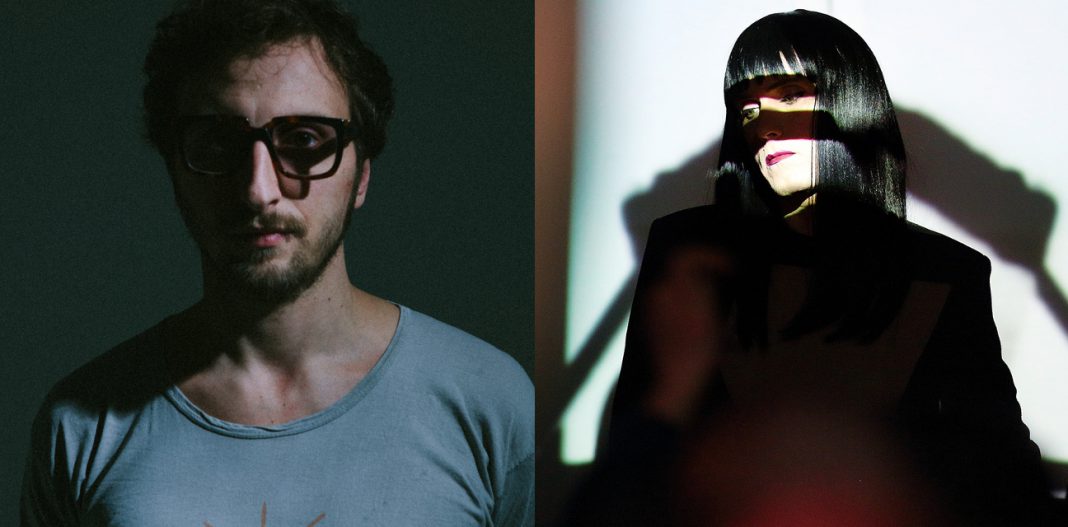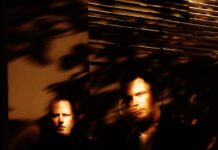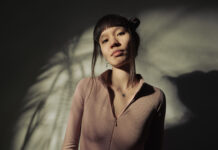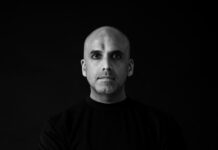Photos: Nico Stinghe (Lucy), Press (Rrose)
Rrose and Lucy entered the techno scene at different moments in time. Before taking on the name Rrose, Seth Horvitz originally started releasing music under the moniker Sutekh in the San Francisco Bay Area scene of the late nineties. Compared to earlier generations, Sutekh’s environment seemed to have a rather critical and intellectual approach to dance music. Using new software like Max/MSP they developed a tumbling, multilayered dance sound that was more volatile and vivid than anything heard before. In the early 2000s, Horvitz left dance music for a couple of years. Working with the music of classical and modern composers such as György Ligeti, Conlon Nancarrow or Johann Sebastian Bach he treaded more academic waters. Returning to the club scene as Rrose, she merged her music into a gender bending performance act inspired by Marcel Duchamp.
Luca Mortellaro alisa Lucy is a late yet irreplaceable contribution to Berlin´s Techno ecology. Techno producers more or less draw from their inspiration from earlier generations of Techno producers, particularly in Berlin, where techno has been the dominant expression of dance music and electronic music for almost 20 years. Lucy’s dark, spacious and complex tracks live on a fundamentally different approach to sound. They are not developed out of the Pop music of the likes of Kraftwerk or Depeche Mode, but out of the 20th century’s vanguard music. Lucy’s philosophical thinking is a formative factor as well. As a scholar and a writer, he developed a very own kind of philosophical tale or fable putting the thought and concepts particular of Friedrich Nietzsche into striking emblems and stories. The recently released The Lotus Eaters EP is the first collaboration of Rrose and Lucy.
How did the two of you meet? How did the idea of a collaboration come up?
Lucy: Before meeting physically we met by music. I was not only fascinated with what I heard but how he developed his Rrose identity, or non-identity. Later we started talking about some remixes. I remixed a track for his label Eaux and he did a remix for Stroboscopic Artefacts. I was happy with the result, and I believe he was, too. At some point we talked on a more personal level. When he was in Berlin he visited me in my studio. We started doing stuff without a specific goal. The music came to life very fast, we started recording stuff easily. It was an effortless, instinctual approach. We found ourselves with quite a bit of material and we started to push the idea around to do an actual release together. We just met a couple of times. Am I wrong, Seth?
Seth: Actually, we only met two times
Lucy: Right, just two sessions in Berlin. We did the mix down and the post-production job each on our own. But the core of it was born within two days. Each session took only a couple of hours. It was fast and satisfying. It was quite effortless.
Seth: I would not say it was effortless. I think during the process it seemed it was a lot of work at times and difficult making decisions. But then we looked back and we realized we made a lot of material. That was surprising.
Stream: Rrose – Waterfall (Lucy Remix)
What was the process like? Did you bring some material you had done earlier?
Seth: We started everything from scratch in fact. Even in between sessions, Luca wanted to pull out all the patch cables from his modular set-up. I was really hesitant and I was like: “Wait! Wait!”. It was a good exercise for me to let go of something and just move on to something new. Because I tend to obsess about details for a long period time, driving myself crazy. It was good to be more spontaneous, drop stuff, change direction quickly, turn things off and delete.
Lucy: I am not as extreme as Seth, but when I work on my own stuff, I am a much slower producer as well. Together with Seth, there is this kind of immediacy. When we talk we don’t need any shields, we can move beyond any kind of social convention.
What does starting from scratch actually means? What would you do?
Lucy: Starting from scratch means to have the whole sound synthesis restart from one oscillator to a filter to the amplifier to the whole chain. Strangely enough, it is still a very homogeneous EP. This is the actual magic of those sessions. When I experience making music like this, it is a sign that a pure inspiration is being translated into music. When this is not the case something completely different occurs each time you start again. Starting fresh anytime is kind of a filter, filtering out the pollution from our interaction.
Many collaborations sound like little more than a mix of what each of the artists does on his or her own. You EP does not seem like a mix.
Lucy: It sounds pretty unitary to me as well. It was me with this new person, visiting and exploring my studio. It was not just one plus one is two, but one plus one is three.





